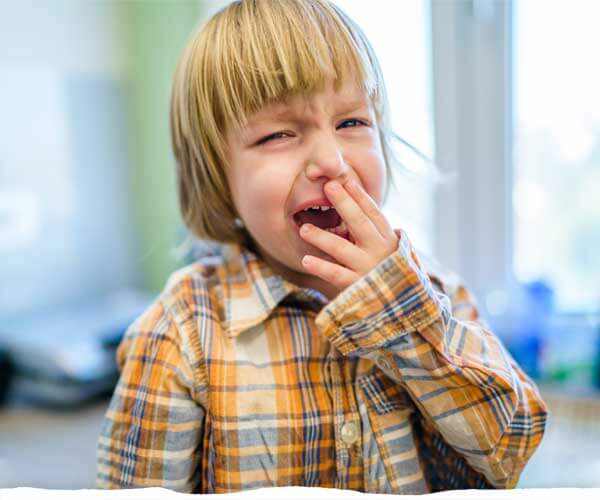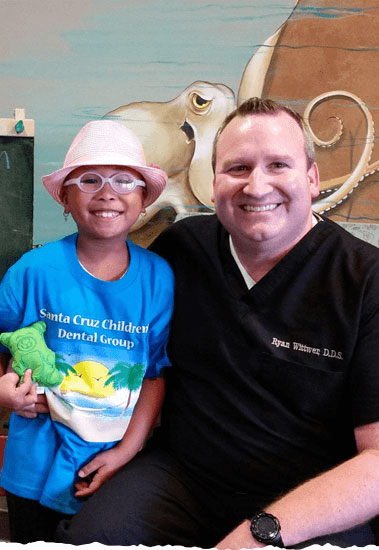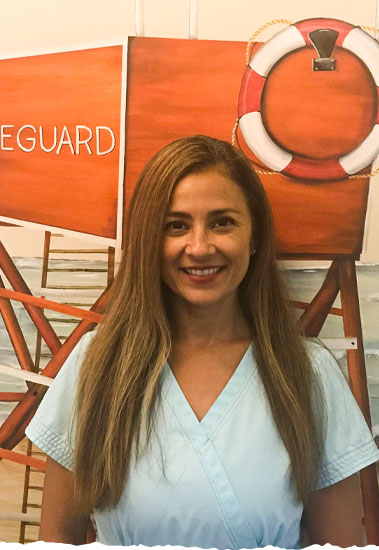Creating Confident Smiles for Your Kids
Click a service below to learn more

First Visit Learn More
The first dental visit is the foundation of a growing
relationship between our family dental office and your
child. We feel it is important that your child becomes
familiar with our office environment and staff as soon as
their teeth start to appear.
At the new patient appointment, the dentist and staff will
spend quality time getting to know you and your child. We
teach your child to be comfortable with dentistry by
explaining the procedures and demonstrating the equipment in
a fun and imaginative way. The office visit will include a
thorough oral examination, x-rays if required, a cleaning
and fluoride application.
A complete review of your child’s medical health and any
special needs or concerns will be addressed. More
complicated procedures, such as fillings, should be done at
a later visit after your child has become familiar with the
office.
You and your child will be given an oral hygiene
demonstration and nutrition counseling. You will receive a
summary of your child’s oral health and future dental needs.
We look forward to your visit and hope you and your child
will have the dental experience of a lifetime.

Infant Care Learn More
We specialize in infant oral health exams and parent
education. We recommend that both mom and dad come to their
baby’s first visit. This early appointment is one of the
best things you can do for your baby. Our doctors will
examine your baby’s teeth, check for decay, make sure teeth
are erupting in the right order, screen all the oral tissues
for diseases, determine proper jaw development and give
valuable information on infant oral care and proper
nutrition.

Special Needs Care Learn More
We’re committed to providing the best dental care for all
children regardless of their developmental or other special
health care needs. We’re skilled in helping families who are
faced with daily challenges, we have developed ways to be
more efficient and decrease the stress of dental health at
home and the dental office. Comprehensive oral health care
is available in a gentle, understanding, environment for
everyone.

Emergency Care Learn More
If you or your child is experiencing a dental emergency,
please call us immediately. If you need urgent treatment
after hours, please call our emergency number. If your child
experiences any of the following: bitten lip or tongue,
object caught in teeth, broken chipped or cracked tooth,
knocked out tooth, loose tooth, toothache, broken jaw, or
any other dental trauma, please contact us. For strategies
to help in the meantime, please visit the
Dental Emergency page.

Home Care Learn More
Prevention is always better than treatment. Brush your teeth
twice daily using any soft-bristled, ADA approved
toothbrush. We also recommend the use of modern electric
toothbrushes such as Sonicare and Braun. Floss daily to
remove plaque between teeth that you can't reach with
regular brushing.
Always rinse thoroughly with water after brushing (or after
meals if you are unable to brush). You may occasionally use
a mouthwash to rinse. Children may benefit from the use of
ACT fluoride rinse, to help prevent cavities from forming in
between the teeth.

Tooth Eruption Learn More
It’s recommended that you bring your baby in for a visit six
months after the first tooth erupts (usually around their
first birthday). The earlier your child visits us, the
quicker we can help you be aware of early problems with your
child’s oral health, and how to best take care of your
little one’s teeth. How to avoid cavities and setting a good
example are important parts of your child’s health. During
your first visit we’ll discuss these techniques.

Crowns Learn More
A crown (often called a cap) covers the tooth and restores
it to its original shape and size. Decay is removed and
cleaned from the tooth and a preformed crown is placed over
the tooth. Unlike adult crowns, in which the crown is made
to fit the tooth, which requires two appointments, baby
crowns are placed in one visit, because the tooth is
prepared to fit the crown.

Teens & Young Adults
Learn More
Teens are caring, intelligent, passionate and understanding
individuals with a keen sense of social justice, identity,
and independence. We provide support and respect for our
teens, tailoring oral health to their unique needs. Our goal
is to create a trusting environment where they can feel
comfortable learning about personal risks related to their
oral health.
As teens enter into early adulthood they are faced with new
risk factors for the development of tooth-related health
problems including sports drinks, juice bars, coffee,
hormonal changes, and mouth breathing.

Digital X‑Rays Learn More
Dental x-rays or radiographs allow the dentist to see things
about your child's oral health that cannot be seen by the
naked eye. These items include cysts, cancerous and
non-cancerous tumors, invisible decay that occurs between
teeth, and the location of teeth that haven't grown all the
way in.
Modern dental x-ray machines are very safe. We use only
state-of-the-art, low radiation machines. The amount of
radiation exposure your child's body receives on an airplane
flight from Los Angeles to New York exceeds the amount of
exposure they will receive from a modern dental x-ray
machine. Contrast this minimal exposure with the risk of not
finding an illness until it is too late, and you can see why
we prescribe regular diagnostic x‑rays.

IV Sedation Learn More
We offer several sedation dentistry options depending on
your child’s needs and how much treatment is needed. Nitrous
oxide is a safe, effective option for children who are
apprehensive about treatment and quickly dissipates with
normal breathing after the treatment is completed.
In office IV sedation is provided for those children who
have fear, anxiety or unease regarding dental treatment, a
sensitive gag reflex, low pain thresholds, children with
special needs and very young children. The anesthesia is
provided by highly-trained, compassionate anesthesiologists
from Bay Anesthesia Group

Thumb Sucking Learn More
Thumb sucking that persists beyond the eruption of the
permanent teeth can cause problems with the proper growth of
the mouth and tooth alignment. How intensely a child sucks
on fingers or thumbs will determine whether or not dental
problems may result. Children who rest their thumbs
passively in their mouths are less likely to have difficulty
than those who vigorously suck their thumbs.
Pacifiers are no substitute for thumb sucking. They can
affect the teeth essentially the same way as sucking fingers
and thumbs. However, use of the pacifier can be controlled
and modified more easily than the thumb or finger habit. If
you have concerns about thumb sucking or use of a pacifier,
consult your pediatric dentist.

Sports Mouth Guards Learn More
We recommend mouth guards for all our sports active
patients. A mouth protector minimizes the potential for
tooth fracture or loss due to traumatic injury. In addition,
it can reduce the concussive effects of certain head
injuries. We provide pro-style mouth guards to all our
patients free of charge once the permanent teeth are
present.














































